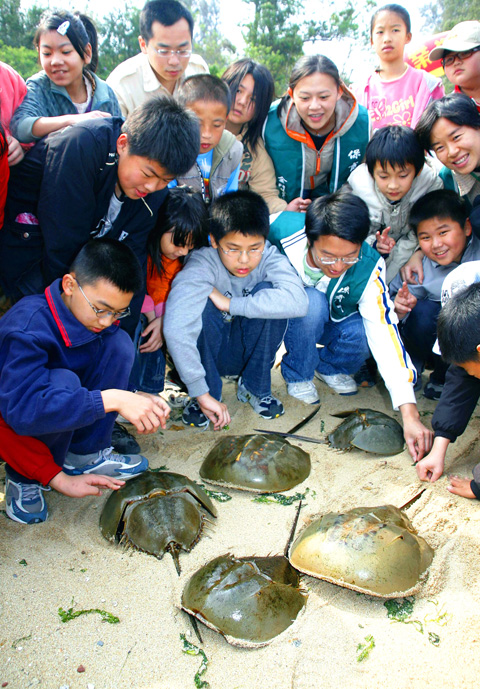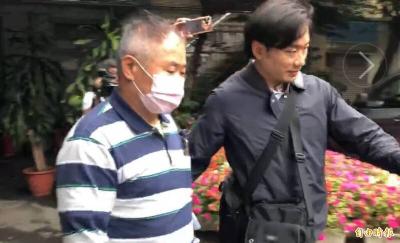Some 350,000 baby Asian horseshoe crabs bred in captivity were released into the ocean near Kinmen yesterday in an effort to conserve the species.
Kinmen County Deputy Commissioner Yang Chung-chuan (楊忠全) led more than 200 Kinmen residents and students in the activity, which was held on the shores of Chienkung islet and the mouth of Wuchiang Creek.
The release was conducted under the supervision of officials from the Kinmen Aquaculture Research Institute (KARI), which bred the crabs.

PHOTO: CNA
KARI researchers said the horseshoe crab is nearly extinct in waters surrounding Taiwan proper but it is occasionally seen near the Penghu Island group and on the west coast of Taiwan proper.
The seas around Kinmen are among the horseshoe crab’s most important natural habitats, but even there, its numbers have declined in recent years as a result of industrial and urban development, the researchers said.
The sharp drop in the crab population prompted KARI to zone an 800-hectare coastal area near Kuningtou as Kinmen’s horseshoe crab conservation district in 1999 in the hope that its population could be preserved.
Since 2006 KARI has staged annual releases of baby horseshoe crabs to help accelerate the natural replenishment of the species, known as a “living fossil” because it has changed little in its 400 million years of existence.
Some 70,000 baby crabs were released last year.
With a distinctive domed carapace shaped like a horseshoe and a stiff pointed tail, the Asian horseshoe crab, or tachypleus tridentatus, is known as one of Taiwan’s few “living fossil” species.

Taiwan would benefit from more integrated military strategies and deployments if the US and its allies treat the East China Sea, the Taiwan Strait and the South China Sea as a “single theater of operations,” a Taiwanese military expert said yesterday. Shen Ming-shih (沈明室), a researcher at the Institute for National Defense and Security Research, said he made the assessment after two Japanese military experts warned of emerging threats from China based on a drill conducted this month by the Chinese People’s Liberation Army’s (PLA) Eastern Theater Command. Japan Institute for National Fundamentals researcher Maki Nakagawa said the drill differed from the

A fugitive in a suspected cosmetic surgery fraud case today returned to Taiwan from Canada, after being wanted for six years. Internet celebrity Su Chen-tuan (蘇陳端), known as Lady Nai Nai (貴婦奈奈), and her former boyfriend, plastic surgeon Paul Huang (黃博健), allegedly defrauded clients and friends of about NT$1 billion (US$30.66 million). Su was put on a wanted list in 2019 when she lived in Toronto, Canada, after failing to respond to subpoenas and arrest warrants from the Taipei District Prosecutors’ Office. Su arrived at Taiwan Taoyuan International Airport at 5am today on an EVA Air flight accompanied by a

A 79-year-old woman died today after being struck by a train at a level crossing in Taoyuan, police said. The woman, identified by her surname Wang (王), crossed the tracks even though the barriers were down in Jhongli District’s (中壢) Neili (內壢) area, the Taoyuan Branch of the Railway Police Bureau said. Surveillance footage showed that the railway barriers were lowered when Wang entered the crossing, but why she ventured onto the track remains under investigation, the police said. Police said they received a report of an incident at 6:41am involving local train No. 2133 that was heading from Keelung to Chiayi City. Investigators

The Keelung District Prosecutors’ Office today requested that a court detain three individuals, including Keelung Department of Civil Affairs Director Chang Yuan-hsiang (張淵翔), in connection with an investigation into forged signatures used in recall campaigns. Chang is suspected of accessing a household registration system to assist with recall campaigns targeting Democratic Progressive Party (DPP) city councilors Cheng Wen-ting (鄭文婷) and Jiho Chang (張之豪), prosecutors said. Prosecutors yesterday directed investigators to search six locations, including the Chinese Nationalist Party’s (KMT) Keelung office and the residences of several recall campaign leaders. The recall campaign leaders, including Chi Wen-chuan (紀文荃), Yu Cheng-i (游正義) and Hsu Shao-yeh